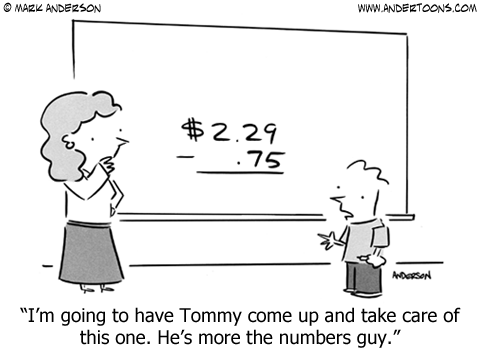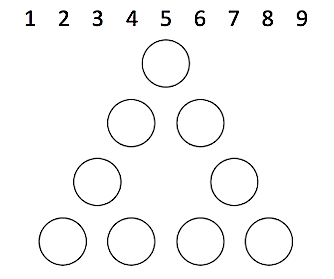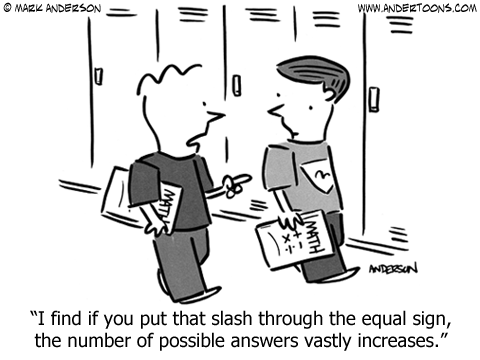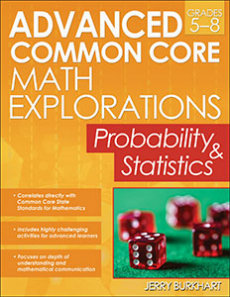Overcoming Myths about “Being Good at Math”
 By Jerry Burkhart
By Jerry Burkhart
When math teachers talk about what they do for a living, the reply is often something like “Oh, I was never very good at math.” In fact, this lack of confidence in math ability seems so pervasive as to be more cultural than personal.
As an experiment, try typing “I used to be good…” into a search engine. “I used to be good at math” will probably show up high (maybe even first) on the list of auto-completions! It appears that even people who start out feeling confident in math often lose this confidence over time.

I was inspired to write this article in part by a book from teacher educator Elizabeth Jackson (more on her later!). Her words crystallized and clarified many of my own thoughts and experiences.
Specifically, we should never assume that people’s lack of confidence in math is naturally “the way people are” or “the way math is.” By identifying the deeper reasons that people doubt their ability to understand math, we can change the situation—for ourselves, our students, and even our society.
Sources of self-doubt in math
Spend a few moments reflecting. What were your own experiences learning math in school? How did they affect the way you feel about math? What do you think it means to understand math? How do you think students, parents, and colleagues would respond to these questions?
Reflections like these typically show that a lack of confidence in math can be traced to two sources: past experiences and inaccurate beliefs about math and how we learn it.
Consider the following common experiences in math class:
- Embarrassment at being unable to respond quickly to a question
- Feeling pressured by timed tests (especially on arithmetic facts)
- Being told to just “do it this way” even when you don’t understand why
- Being told to “do it this way” even when your own ideas make more sense to you
- Memorizing mountains of procedures that seem completely unconnected
- Freezing up when you forget how to do something
- Feeling overwhelmed by long, messy calculations
- Facing story problems that look like random collections of words
Do these sound familiar? At first glance, it may appear that teachers are at the root of the problem of confidence. However, a closer look suggests something deeper. Teachers’ actions, too, come from past experiences and beliefs. Anxieties and doubts may be passed from one generation to the next.
A brief story
I am reminded of a time that I participated in a Critical Thinking workshop for university faculty. Each participant was responsible for presenting an activity in their field. As a newer faculty member, I initially felt nervous when it was my turn to present. However, I quickly discovered that the mere fact that I was presenting on math meant that others were more nervous than I was.
I presented a problem about putting numbers into circles on the sides of a triangle in such a way the sum on each side was the same. (See this MiddleWeb post to read more about the problem.)

As it turned out, the person who found a solution the most quickly had little confidence in her math ability. Rather than feeling encouraged and excited by her success, she concluded that she had not solved the problem “logically.” The fact that her ideas were creative and insightful never occurred to her. She probably never imagined that math could involve creativity and insight!
Some takeaways
This notion that math consists of some mysterious set of “logical” rules that only a select few truly understand is one of a number of myths that get in the way of learning. I have compiled a list of such myths here. One of them relates specifically to this situation.
Myth: Mathematically talented people have special abilities that ordinary people lack.
While the full list focuses on the experiences of advanced learners, many of them are relevant to all students and their teachers. The most harmful one may be
Myth: Math is mainly about performing procedures accurately and quickly.
If you look back at the list of common experiences in math class, you will see that most of the items are related in some way to speed and accuracy of computation! Not only does this myth lead to unnecessary anxiety and doubt, it is an inaccurate reflection of what math is and how people learn it. (See the book Mathematical Mindsets by Jo Boaler.)
The consequences of low confidence in math
When people begin to lose confidence in their math ability, it can lead to a discouraging cycle in which self-doubt impedes learning, which in turn fuels further self-doubt. The end outcomes may include limited career opportunities and personal discomfort in everyday situations that involve using math. The implications for teachers are equally significant.
When teachers enter upon their careers doubting their math abilities, it is natural for their discomfort to express itself in actions that make their students anxious as well. It also becomes harder to take active steps to deepen their own understanding of math in ways that would benefit their students. This relates to another myth, common among teachers of young learners.
Myth: Elementary teachers do not need to understand math deeply.
The truth is that everyone who teaches math can understand it at a deep level. This does not necessarily mean taking advanced high school or college courses. Rather, it involves gaining a richer, more connected understanding of the math that you teach—what Liping Ma calls PUFM (Profound Understanding of Fundamental Mathematics). Much of this learning can happen directly in the context of the classroom by listening closely to students’ ideas, reflecting on them, talking with colleagues about them, and using them to inform instruction.
You might think that the story is different for secondary math teachers. In my experience, however, the issues are similar, though the doubts and anxieties may take a different form.
Those who have been successful enough in school mathematics to earn a math teaching degree sometimes find it even harder to reconsider their beliefs about what mathematical learning looks like. Stepping outside comfortable boundaries in order to think about math in new ways can require even more courage when you are expected to be knowledgeable in your field!
What we can do about it
I mentioned earlier that this article was inspired in part by a book from Elizabeth Jackson, a teacher trainer from the UK. Her book, Reflective Primary Mathematics, tackles the issue of confidence head on by providing prospective math teachers with a detailed roadmap for changing their relationship with math.
Jackson’s process includes understanding historical difficulties in learning math, identifying a need for change, becoming aware personal of feelings, attitudes, and beliefs about math, reflecting on your image of a mathematician, developing a personal philosophy for teaching math, and making and implementing a plan for change.
Changing the culture of mathematical learning from one of doubt and anxiety to one of personal belief and empowerment will take time and effort. I believe that such an effort will include:
- Teacher training that addresses the issue of confidence in a robust manner,
- Open conversations about confidence with math students in the classroom,
- Minimizing high-stress teaching methods such as timed tests and competitions,
- Making more space for intuition, insight, and creativity in the process of learning math,
and above all, - Hearing, respecting, and responding to students’ ideas when we teach.
Moving forward
Current efforts to improve instruction through teacher collaboration hold enormous promise, but they often appear to lead to a point of diminishing returns in math. I believe that we need to dig deeper than data analysis and differentiation.
Imagine the long-term benefits if teachers, schools, districts, and teacher preparation programs were to address the issue of mathematical confidence in an intentional, comprehensive, systematic, and vigorous way. The possibilities for growth are inspiring!

If you are part of exciting work that builds both teachers’ and students’ confidence in math, I hope you will share your experiences below.
Resources
Reflective Primary Mathematics: A Guide for Student Teachers, by Elizabeth Jackson
Ten Myths That Hold Bright Math Students Back by Jerry Burkhart
Creative Math Prompts by Jerry Burkhart
Mathematical Mindsets by Jo Boaler
__________________________________________
 Jerry Burkhart is a mathematics educator and consultant with over 30 years of classroom experience. He is the author of the book series, Advanced Common Core Math Explorations, published by Prufrock Press, and he presents regularly at state, regional, and national conferences on topics related to mathematical talent development.
Jerry Burkhart is a mathematics educator and consultant with over 30 years of classroom experience. He is the author of the book series, Advanced Common Core Math Explorations, published by Prufrock Press, and he presents regularly at state, regional, and national conferences on topics related to mathematical talent development.
As founder of 5280 Math Education, he helps schools and districts implement research-based programming for gifted math students and offers tools and strategies for developing and nurturing adventurous math learners. Visit his store at MyEdExpert. And read more of his articles here at MiddleWeb.


































I, too, have taught math for over 30 years, from K-5, 1st grade, 8 years of MS, and HS math. I have over 8 years experience coaching teachers of all grades in exactly what you talk about! I believe you hit the nail on the head with your lists of ways to help teachers and students become more confident in their math. I find many parents are also not confident in math and that transcends into their confidence in helping their children to learn math in creative ways. Many misconceptions abound in what Common Core Math is supposed to provide…. but I feel it is on track with giving opportunities to truly understand and to discover multiple ways to use math and to solve problems. Thank you so much for your insights!